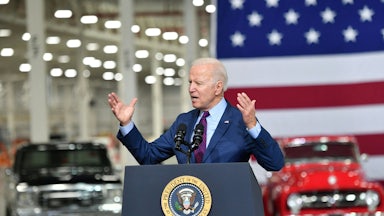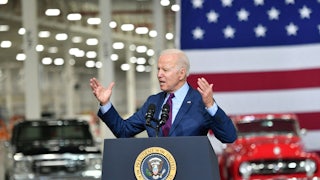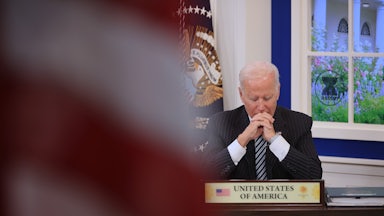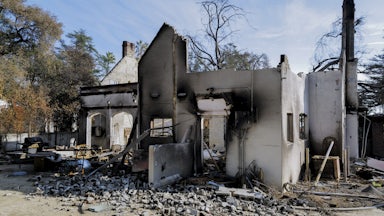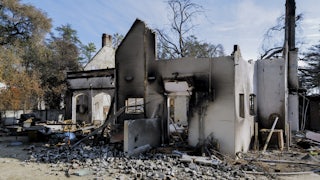Before a panel Friday at the COP26 Glasgow climate summit announcing that the Energy Department would be investing in an “earthshot” to bring the price of carbon capture and sequestration down to $100 per ton, Secretary Jennifer Granholm was approached by Port Arthur, Texas, native John Beard Jr. In the exchange—captured on video by the nonprofit Earthworks and provided to The New Republic—Beard asked Granholm if she’s willing to “stop oil and gas exports to save the climate for the Gulf Coast.”
About 100 miles from Houston, Texas, Port Arthur is home to two liquefied natural gas, or LNG, export facilities and several of the country’s biggest refineries, including an eponymous one that pumps out more than 800,000 barrels per day. Black Texans like Beard, who worked in the oil industry for 38 years, have cancer rates 15 times the state average. Beard, who is the founder of the Port Arthur Community Action Network, got word a childhood friend was having cancer surgery on Friday, before the panel.
“Are you saying am I going to ‘stop oil and gas exports?’” Granhom responded. “That’s not my lane, stopping oil and gas exports. That’s more the Department of Interior. We can permit the facilities, but the facilities are already … they’re already permitted. We don’t have a huge ...” she said, before trailing off and continuing to speak with Beard.
But gas exports are absolutely within Granholm’s lane. The department doesn’t control oil or coal exports. Yet under the Natural Gas Act, the Department of Energy has the exclusive authority to approve whether companies can import and export gas.
“What’s important to understand is that companies who have received authorization from DOE to export LNG make the ultimate decision on the quantity and destination of LNG exported,” DOE spokesperson Charisma Troiano said over email (her emphasis). “Similarly, the development of fossil energy infrastructure has regulatory review from various state, local, and federal authorities, but the ultimate decisions on fossil infrastructure investments are made by private industry.” Troiano clarified that export infrastructure—including pipelines and LNG export facilities—fall outside of DOE jurisdiction. The companies behind most LNG exports from the United States apply to the Federal Energy Regulatory Commission for the authority to site, construct, and operate LNG export terminals and pipelines. They apply separately to DOE for the authority to export gas from them.
The U.S. was the world’s second-largest gas exporter in 2020. As with all fossil fuel exports, the greenhouse gas emissions caused when that gas is burned abroad are not counted toward the totals that the U.S. has pledged to bring down by 50 percent below 2005 levels by 2030, under its commitment to the Paris Agreement.
DOE Assistant Secretary of International Affairs Andrew Light, who was present at the event on Friday, once explicitly described his job as being to encourage gas exports. “My job in this role is to make sure U.S. gas is competitive around the world,” Light told lawmakers at a confirmation hearing in June. “More and more countries are looking for cleaner sources of gas. Russia has the dirtiest source of gas right now. We’ve got to make sure ours is cleaner and that ours fill those markets around the world. That’s what I intend to do.”
The Biden administration has a number of tools it could use to curb fossil fuel exports. By declaring a national emergency, for instance, Biden could reinstate the long-standing crude oil export ban that was quietly repealed in 2015, just days after the Paris Agreement was brokered. Over the following five years, crude oil exports grew by 750 percent. While such an action doesn’t fall under the Department of Energy’s direct authority, Granholm has in recent interviews suggested the administration hasn’t ruled out reinstating the ban—not for climate reasons but to combat rising fuel prices. “That’s a tool that we have not used, but it is a tool as well,” she told the Financial Times in January. Reinstating the ban, a 2020 report from Greenpeace and Oil Change International found, would be the emissions equivalent of closing between 19 and 42 coal-fired power plants.
Port Arthur isn’t just a cancer cluster. It’s also on the front lines of the climate crisis. The city has had major hurricanes in the last 15 years. Hurricane Harvey, in 2017, brought over five feet of rain in four days. “We cannot continue to pour billions of tons of greenhouse gases into the atmosphere and think that the planet will survive, or places like Port Arthur, that’s right on the Gulf Coast, will survive,” Beard said, just after the event. “Right now we hear a lot of talk, and we don’t see a lot of commitment. Not real commitment.”
The International Energy Agency’s Net-Zero Roadmap, released earlier this year, concluded that keeping warming below 1.5 degrees Celsius (2.7 degrees Fahrenheit) means halting all new investment in new oil, gas, and coal from this year on. “If governments are serious about the climate crisis, there can be no new investments in oil, gas and coal, from now—from this year,” IEA’s Fatih Birol—who spoke alongside Granholm Friday—told The Guardian, when the report was released.
“It’s fundamentally inconsistent,” Beard told me, “for the U.S. and for the president to talk about other countries reducing the amount of carbon they put into the atmosphere, when America seems to be going full speed ahead with developing the means of exporting that liquid poison and liquid gas poison to other nations.”

